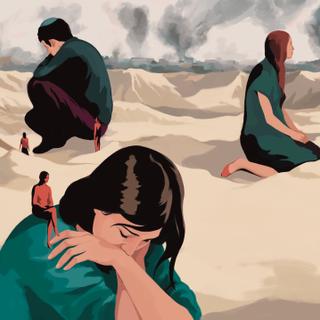


Israeli therapists take on healing a traumatized population
FeatureThe Hamas massacre in the Jewish state on October 7 deeply shocked all Israelis. Across the country, psychologists and psychiatrists have been working both directly and indirectly to help the victims.
Our telephone conversation was only interupted for a few minutes. "An alert!" In Tel Aviv, everyone around understands that you hang up when you suddenly hear the siren. There are up to three or four alerts a day. Then you have to throw yourself into a shelter or a parking lot or, if you're on the freeway, stop on the hard shoulder, jump the guardrail, take cover under a bridge or lie down in the ditch, your head between your arms. A minute later, we heard the enormous "boom!" sound made by the Israeli Iron Dome anti-missile system when it intercepted one of the rockets fired by Hamas from Gaza. Then everyone got up, dusted themselves off and went on with their lives.
So we resumed our conversation almost as if nothing had happened. The person we were speaking to, Reuven Dar, was about to leave for Hotel David, on the shores of the Dead Sea, where some of the refugees from the kibbutzes attacked by Hamas on October 7 had gathered.
Usually, this Tel Aviv University psychology professor specializes in treating patients with obsessive-compulsive disorders. His patients smoke several cigarettes at the same time, wash their hands up to 20 times in a row or endlessly check that they have turned off the electricity. Since the killings on October 7, the nightmare of pogroms that plagued the first generations to arrive in Israel has resurfaced, and, he said with a wry sense of humor, "my patients are better because all they think about now is war. Their fears have finally joined those of others, and their pain has become normal."
It has to be said that, apart from the anguish caused by the alerts, the war seems to have invaded the entire mental space of this country, which is so used to it. In homes, cafés and grocery stores, screens broadcast images of the conflict as seen by Israelis: the pleas of the families of hostages, fights between former army generals, Benjamin Netanyahu's warlike speeches and a deluge of criticism of the prime minister himself. Also, in recent days, there have been the images of soldiers advancing into the heart of ruined Gaza.
The need to survive
In the life before, they could campaign for Palestinian rights and lament aloud that "Gaza should not become a kind of Singapore," forgetting the confinement, poverty and indifference in which this tiny territory, an hour's drive from Tel Aviv, experienced. In the life that has followed, the trauma of the killings has taken everything away. All that remains is the need to survive by eradicating the Islamist movement. Are civilians and children dying under the bombs? It's because Hamas is using them as human shields, the televisions keep repeating.
You have 75% of this article left to read. The rest is for subscribers only.
